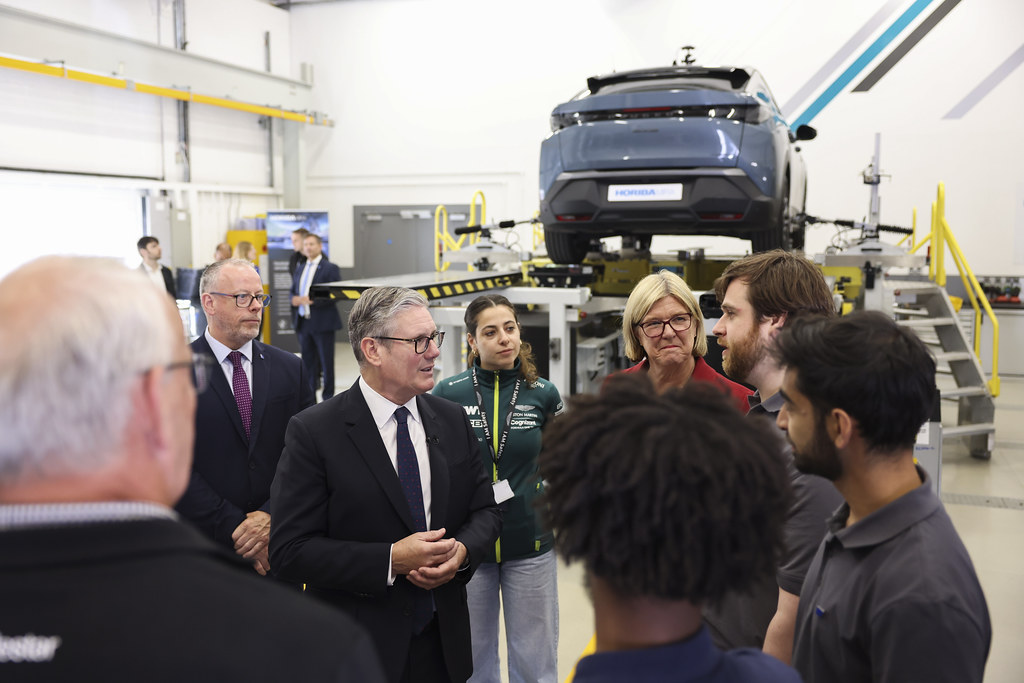MTI and NWSLC leaders discuss skills for the future with Prime Minister and Cabinet Ministers during strategic visit to HORIBA MIRA

Leaders from the MIRA Technology Institute (MTI) and North Warwickshire and South Leicestershire College (NWSLC) had the prestigious opportunity to brief Prime Minister Sir Keir Starmer, Chancellor Rachel Reeves, and Secretary of State for Business Jonathan Reynolds MP during a high-profile ministerial visit to HORIBA MIRA yesterday (23 June).
The visit highlighted the vital role of skills development in supporting the UK’s newly launched Industrial Strategy.
Lisa Bingley, Operations Director at MTI, and Marion Plant OBE FCGI, Principal and Chief Executive of NWSLC, were among regional leaders invited to share how their organisations are helping to deliver a pipeline of highly skilled talent for the advanced manufacturing and automotive sectors.
The event, which took place at the heart of the Midlands’ automotive technology cluster, brought together Government ministers, Nuneaton MP Jodie Gosling, John Slinger MP for Rugby, Rachel Taylor MP for North Warwickshire and Mayor of the West Midlands, Richard Parker, as well as key industry representatives to discuss upskilling, apprenticeships, and the future of work.
The discussions were shaped by the Government’s new 10-year Industrial Strategy, which targets eight high-growth sectors including advanced manufacturing, clean energy, digital technologies and artificial intelligence. With a strong focus on regional economic growth, the strategy aims to strengthen the UK’s global competitiveness while addressing challenges such as high energy costs and regulatory barriers.
As part of the agenda, Lisa Bingley shared her personal career journey, from apprentice to Operations Director, while also detailing MTI’s contribution to the region’s skills ecosystem.
She said:
“It was an incredible honour to speak directly to the Prime Minister, the Chancellor and Jonathan Reynolds MP about how the MIRA Technology Institute is playing a central role in preparing the workforce for the industries of tomorrow.
“MTI has now welcomed over 60,000 visitors, delivered certificated learning to 24,000 learners, and provided more than 5,000 students with STEM-focused experiences, we’re delivering skills in everything from T Levels to apprenticeships and degree-level qualifications, working closely with employers to match real-world demands.
“At MTI, we’re proud to be equipping people with the tools they need to succeed in sectors like automotive electrification, robotics, and cybersecurity, fields that are critical to the UK’s industrial future. The new Industrial Strategy rightly places skills at its heart, and we are ready to rise to the challenge.”
Marion Plant spoke personally to all three senior ministers during the visit, highlighting the power of partnership and NWSLC’s wider role in delivering high-quality technical education and championing the Government’s renewed focus on skills.
Marion said: “I spoke with the Prime Minister, Chancellor, and Secretary of State about the exceptional collaboration between Further Education, Higher Education, and our industry partner HORIBA MIRA at the MTI.
“Both Lisa and I were delighted to share with ministers how NWSLC is playing a pivotal role in delivering the skilled workforce that will drive the UK’s industrial future.
“The CEO of HORIBA MIRA strongly endorsed our role in helping develop the talent his industry needs, demonstrating the real impact we are making together.
“As a college rooted in our local communities but with a national impact, we’re working hand-in-hand with employers to develop innovative, flexible pathways, from T Levels and apprenticeships to higher technical qualifications, that enable learners to thrive in high-growth sectors like electrification, AI, and clean energy.
“The Government’s new Industrial Strategy rightly recognises that skills are the cornerstone of productivity and prosperity. We’re proud to be part of the solution, supporting learners of all ages to succeed and ensuring that industry has access to the talent it needs to grow and compete globally.”
The visit included a tour of HORIBA MIRA’s cutting-edge facilities and featured discussions on how organisations like MTI and NWSLC are aligning their educational programmes with sector demands, particularly around electrification, artificial intelligence, and sustainable engineering.
The ministers also heard about the roll-out of new robotics initiatives, and how collaborative programmes are supporting learners from work experience level through to graduate entry, helping to address regional skills shortages.
The Industrial Strategy, published this week, sets out plans to boost economic growth by supporting key industries and making it easier for businesses to innovate and invest. It includes five detailed sector plans focused on clean energy, advanced manufacturing, digital and technology, professional services, and the creative industries. Further plans for life sciences, defence, and finance are expected later in the year.
The Government has acknowledged that the UK has often been “too regulated to take advantage” of global opportunities and aims to adopt a “new approach” by reducing planning barriers, cutting energy costs, and overhauling regulation.
With its strong emphasis on skills, the strategy reinforces the importance of institutions like MTI and NWSLC in supporting long-term industrial competitiveness.











Responses